- Home
- Linda Newbery
The Sandfather
The Sandfather Read online
Table of Contents
Title Page
Copyright Page
Dedication
Chapter 1 - SHOVE
Chapter 2 - HALF
Chapter 3 - EXCLUDED
Chapter 4 - MARBLES
Chapter 5 - TWITCHY
Chapter 6 - TIDE
Chapter 7 - FAMOUS
Chapter 8 - SANDMAN
Chapter 9 - PRINCE
Chapter 10 - SEARCH
Chapter 11 - HIMSELF
Chapter 12 - FAMILY
Chapter 13 - GLASS
Chapter 14 - SAIL
Chapter 15 - TOMORROW
Chapter 16 - PROOF
Chapter 17 - MOONY
Chapter 18 - DAMAGE
Chapter 19 - SANDFATHER
Chapter 20 - NOT
Chapter 21 - LIFEBOAT
Chapter 22 - GONE
Acknowledgements
ABOUT THE AUTHOR
Before you read The Sandfather, here’s what readers have said about Linda Newbery’s Nestlé Award-winning novel Catcall . . .
I wanted to read for hours on end because the book kept me on the edge of my seat.
A fantastic ending! I love the way the author so richly describes the characters.
It’s an action-packed book and it’s got scenes when you just want to read on.
It grips you to the pages and is definitely quite scary in some parts.
It is as if you are stepping into the character’s body and seeing everything happen . . . I have no idea where she gets her ideas from, but she is definitely a genius.
It is a haunting book that hooked me in from the first line.
For more information about Linda’s writing - or to tell her what you thought about
The Sandfather - visit www.lindanewbery.co.uk
Also by Linda Newbery
At the Firefly Gate
Lost Boy
Catcall
Nevermore
The Sandfather
LINDA NEWBERY
Orion
www.orionbooks.co.uk
An Orion Children's ebook
First published in Great Britain in 2009
by Orion Children’s Books
a division of the Orion Publishing Group Ltd
Orion House
5 Upper St Martin’s Lane
London WC2H 9EA
An Hachette Livre UK Company
1 3 5 7 9 10 8 6 4 2
Copyright © Linda Newbery 2009 Illustrations copyright © Ian P. Benfold Haywood 2009
The rights of Linda Newbery and Ian P. Benfold Haywood to be identified as the author and illustrator of this work respectively have been asserted.
All rights reserved. No part of this publication may be
reproduced, stored in a retrieval system, or transmitted,
in any form or by any means, electronic, mechanical,
photocopying, recording or otherwise, without the
prior permission of Orion Children’s Books.
A catalogue record for this book is available from the British Library.
eISBN : 978 1 4440 0040 5
www.orionbooks.co.uk
This ebook produced by Jouve, France
To the memory of Maggie Noach,
literary agent and friend
Hal was trying to run - stumbling, floundering, his feet sinking into loose sand. Ahead, the Sandfather walked away, surer-footed, his outline blurred against the dazzle of sea. He was made of the same stuff as the beach: fine, glittering grains, moulded into man-shape. He belonged here.
Hal tried to shout ‘Wait!’ but the word lodged in his throat.
The Sandfather didn’t pause, or look back. He splashed into the shallows, then waded in deeper. The waves tugged at him, fretted and sighed, washed at him and over him. Dissolved him.
Hal stood helpless on the shore. Now there was nothing to show where the Sandfather had been: only the sea’s vastness, and the long curve of the bay.
1
SHOVE
Hal blamed Luke. Luke blamed Hal. Afterwards, trying to account for himself in the Year Head’s office, Hal couldn’t explain how annoyance had exploded into rage, how it had taken him over. How Luke had goaded him to the point of lashing out in fury. Wanting to hit. Wanting to hurt.
Luke didn’t know when to stop; that was the trouble. Those things he kept saying about Mum, about Grandad - like a wasp that had got inside Hal’s shirt and was stinging him, burning and branding him, while he swatted in vain.
The corridor at lesson change-over time - with the flow of bodies in both directions, people dawdling, people pushing past - was hardly the best place for a fight. But all Hal could see was the smug expression on Luke’s face. It filled his mind, maddened him.
It began with a shove, and, through clenched teeth, ‘Shut it, will you? Just shut it!’ But the push was harder than he intended. Luke, unbalanced by his rucksack, fell heavily against a window-ledge. Righting himself, he directed a murderous glare at Hal, then shrugged off the rucksack and leapt at him.
‘Fight! Fight! Fight,’ chanted eager voices. And now Hal and Luke faced each other like gladiators in an arena, surrounded by faces keen with excitement or alarm. Luke’s expression was a taunt.
Osman tried grabbing Hal’s arm. ‘Pack it in, you two!’
‘Go for it, Marbles!’ a voice shouted; another jeered, ‘Watch out, he’ll go mental.’
Hal didn’t look to see who’d called out. He launched himself, whamming his fist into the softness below Luke’s ribs. Luke doubled up, but recovered with a head-butt that slammed into Hal’s chest, winding him. Then it all got messy - scrabbling and grappling for holds, trying to kick, to wrestle free.
‘Boys, boys!’ said a female voice.
Dimly Hal registered that another body was intruding, a hand on his shoulder, pulling; a waft of perfume reached his nose. He lurched and toppled; hearing a gasp, he shifted his focus from Luke’s next move, and saw a frail figure stagger back to collide hard with the wall, then crumple.
Books, bag and stick were strewn across the carpet. She’d fallen awkwardly, like a dropped puppet. Her skirt had flared out above her knees, revealing legs that looked too thin for the clumpy shoes she wore.
Ms Kenwood. Who had to walk with a stick because of arthritis or something.
It seemed all wrong - wrong and suddenly more serious, an adult disaster forcing its way into a private quarrel. Ms Kenwood seemed too shocked to get up, even to try; only her eyes moved in her pale face.
There was a moment of frozen silence. The other kids had backed away, leaving Hal and Luke exposed. Fights weren’t unusual, but knocking over a teacher - a disabled teacher - was unheard of. What if she was injured? Something broken? She looked frail enough for an arm or a leg to snap.
‘Christ!’ Luke muttered. ‘You’ve done it now, Marbles.’
Someone giggled nervously. A corridor-jam was building up in both directions, as people tried to move along, or were drawn by curiosity. Only now did time seem to jolt itself forward again.
An older girl moved to help Ms Kenwood - ‘Miss! Are you all right?’ - and Osman began to pick up the scattered books and belongings.
‘I - I think so.’ Ms Kenwood gave a weak smile. ‘If you could just - oh—’
Hal couldn’t move, couldn’t think. He felt big and clumsy, faintly dizzy: mind whirring, eyes not quite seeing. He might have been watching something in a play or on TV, nothing to do with him. How had this happened?
‘What’s going on here? Let me through.’ This voice belonged, unmistakably, to Mrs Stanley, Head of Year Nine. The barricade of watchers parted to let her through, and at once she was in charge. She stared, taking in Ms Kenwood on the floor, now being helped gingerly to her f
eet by the year-ten girl, then her pale eyes swerved to Hal and to Luke, who reached up a hand to straighten his tie.
‘Get along to your lessons, all of you,’ Mrs Stanley said. ‘No, not you, Hal. Nor you, Luke. To my office.’
Was she telepathic, or what? How did she know Ms Kenwood hadn’t been taken ill, or fainted? But she did know. She was one of those teachers no one ever thought of disobeying. At once, the corridor traffic began to move smoothly in both directions, people keeping to the left, as they were supposed to. Mrs Stanley turned to Ms Kenwood, who was standing unsteadily, supported by the girl. Osman had given her back her stick, and now, at Mrs Stanley’s instruction, was fetching a chair from the nearest classroom.
‘What are you two hanging round for?’ Mrs Stanley snapped at Hal and Luke. ‘I said go to my office. Wait there till I come.’
Ms Kenwood looked weak and dithery; she stood clutching one elbow. Was her arm broken, elbow dislocated? All because . . . Hal tried to replay the incident in his mind; wished he could go back and wipe the whole thing, start again.
Luke turned to go. Hal dithered, feeling that he ought to speak.
‘Uh . . . sorry,’ he mumbled.
Ms Kenwood’s eyes were big and swimmy. She looked about to speak, but Mrs Stanley got in first. ‘I should hope you are sorry! At the very least. I’ll deal with you in a moment.’
He followed Luke. Neither spoke until they reached reception; then Luke said, in an undertone, ‘Look, it was an accident, right? You didn’t mean to do it.’
‘What do you mean, I didn’t?’ Hal flared. ‘What about you?’
‘Yeah, right - blame me, why don’t you?’ Luke flung back. ‘You’re the one who’s losing it—’
His face was doing that mocking thing again, that sneer that acted on Hal like an electric goad. Anger coursed through him all over again. He grabbed the strap of Luke’s rucksack and yanked it hard; letting out a yelp, Luke was flung off-balance. Hal twisted him in a head-lock. In a voice that didn’t sound like his own, he snarled into Luke’s ear, ‘Lay off - got it? Just leave me alone.’
‘Loser!’ Luke’s voice came back, muffled by Hal’s arm.
Hal raised his knee, getting a satisfying ooomp from Luke. But there was a wheezing gasp as the automatic doors parted, and now here was the suited figure of the Head. The receptionist had scuttled out from behind her glass hatch, and a visitor, a woman with a sharp, peevish face, was staring from a low chair by the noticeboard. Hal had lost all sense of his surroundings, but now they sprang out at him in vivid colour - the art displays, the Head’s red tie, the visitor’s bright green raincoat.
What was he doing?
‘Stop that at once!’ barked the Head, as if Hal wasn’t already as still as a waxwork.
‘I saw what happened, Mr Blake.’ The receptionist stepped forward, darting nervous looks at each face in turn. ‘This boy here just flew at this other one, and started wrestling him.’
Mr Blake frowned. ‘Marborough, isn’t it? Hal Marborough. And—?’
‘Luke Spicer,’ Luke supplied.
‘I do apologise for this,’ Mr Blake said smoothly, turning to the visitor. ‘Excuse me just one moment.’ Then, to the boys, ‘Wait here. And smarten yourselves up, both of you.’ He indicated the precise spot where they were to stand.
Hal looked down at the carpet. His brain was throbbing; hot tears would burst out of him if he tried to speak.
You’ve done it now, Marbles, Luke had said. And probably he had.
2
HALF
As always, Hal went into JJ’s to tell Mum he was home. He opened the door to the hot, scented air inside, the busy sound of driers, and Radio 1 cheerful in the background. Mum was there, with a customer, busy with comb and scissors and conversation.
Usually he went straight to Mum, even if she had a client, but this time he stood in the reception area and waited for her to see him. She glanced his way, quickly excused herself and came over. She gave him her usual kiss and arm-rub, and he thought for a moment that she didn’t know. But then she said, ‘Mrs Stanley phoned.’ Just that: no more.
‘Uh.’ Hal didn’t trust himself to speak. Was everyone looking at him? He felt hot and awkward. Too big, too male in this feminine place.
‘You go on up. We’ll talk about it later. All right?’
Hal nodded, swallowing hard.
‘There’s carrot cake if you’re hungry. See you in a bit.’ Mum turned back to her client; Jacky, the salon owner, gave Hal a big grin and a wave.
Mum always wanted to know everything about his day - what lessons he’d had, how he’d done in PE, whether he’d been praised for good work or effort. But this day he wanted to forget. There was no way he could keep it from Mum, though: not if Mrs Stanley had been on the phone.
‘You know how things stand, Hal,’ she’d told him in her office. ‘You’ve been in here often enough. But you just don’t seem able to control yourself. I’ll have to take it further.’
Outside, he went along the row of shops, through the door between the newsagent’s and the fish-and-chip shop, and upstairs to the flat. Take it further. What did that mean - chuck him out of school? Mum couldn’t know quite how bad it was, not yet, or she wouldn’t have been talking about carrot cake. He had the sense of having crossed a line. Mrs Stanley usually finished her telling-off with a joke and a smile: a rather fierce one, but still a smile. There’d been no smile today, no lightening of tone. And he hadn’t been allowed back into lessons. He’d spent the whole afternoon in Mrs Stanley’s office, working by himself, or at least pretending to work while he fretted about what would happen next.
Course, it wasn’t as bad for Luke. Luke was in trouble too, but he hadn’t had all those warnings; hadn’t been hauled up to the Year Head’s office several times before. Besides, Luke could blag his way out of anything.
Hal didn’t want to think about Luke. He dumped his rucksack in his room and changed into jeans and hoodie. For once he hung his blazer and trousers in the wardrobe instead of flinging them over the back of a chair; he’d better start getting something right.
Into his mind flashed the picture of Ms Kenwood sprawled and winded, and the fear in her eyes - fear of what being knocked over might do to her. Mrs Stanley had made sure Hal was well aware of that. It wasn’t like someone pushed over in a game, who’d just get straight up and carry on playing. Mrs Stanley had wanted to call an ambulance, to get Ms Kenwood to A & E, but Ms Kenwood insisted that there was no need, nothing broken. Still, her husband had been summoned from work to drive her home and look after her.
Whoever’s fault all this was, it definitely wasn’t hers. With a wincing shrug, Hal tried to blank her out of his thoughts.
He turned on his PlayStation, but couldn’t summon any interest; switched on the TV, but found nothing to hold his attention; wandered round the flat, and stopped at his reflection in the bathroom mirror.
Still, sometimes, his face surprised him, though he ought to know what it looked like by now. But often he thought he knew only half of it. Half of himself.
There were glimpses of Mum in the face that looked back at him: the slim nose, the well-defined lips. But the rest was different - the dark brown eyes (Mum’s were blue), the dark curly hair (Mum’s was brown, with copper highlights). And the skin. Beautiful skin, Mum said, quite without blemish. Not fair and prone to sunburn, like hers. Not black either, but somewhere in between. Caramel, she said. Or good strong coffee. Or crème brûlée. Or toast done to the perfect degree of brownness. Good enough to eat, she was always telling him.
But half of him was missing. The black half. His father’s half.
At school Hal wanted to think of himself as black, but everyone knew he had a white mother. How could he be one of the black boys, when there was no one black in his family? Dual heritage, he was called now. But the dual heritage people in his form included Kazumi who was half-Japanese and Jazza who was half-Indian. Neither was like him, and they both had two parents, so knew
what their different halves were. All Hal knew was that his missing half was Afro-Caribbean. He was proud of that, but he wanted more. Wanted something to get hold of and keep.
Who is he? Hal asked his reflection. Who’s my Dad? Where is he? Does he know about me?
Mum would never tell him, no matter how he pleaded.
‘Don’t you know who he is? Is that it?’ he would try.
That always made her hesitate, so that Hal thought she’d have to give in. She didn’t want him to think there could be several possible fathers - what would that say about her? But if she denied it and said yes, of course she knew, then why wouldn’t she tell him?
She did know. Hal knew she did. So why couldn’t she just say?
‘Why do we live here?’ he’d asked her once. ‘Is it cos my dad’s from here?’
Mum had looked startled, then her face took on the shut, obstinate look he recognised too well. ‘No, no, he isn’t. Why are we here?’ For a second she looked unsure. ‘Well - it just turned out that way. I got a job and a flat, and it suited us, and we’ve stayed. I suppose one day we could live somewhere else. Where would you like to live?’
She made it sound as if he could choose anywhere he fancied: a New York penthouse, a castle, a ranch.
‘By the sea,’ he said. ‘I’d like to live by the sea. Like you used to.’
Mum gave a small sigh, as if she’d like that too.
Still, at least he knew not to look at every black man he saw around town or at Powerleague or at the leisure centre, wondering if one of them might be his dad. It had been a game he’d always played, sometimes with Luke, until Luke had turned traitor. That one there. No, that one. No, too young, too old. No, he’s someone else’s dad. Hal didn’t want to share his dad with anyone.

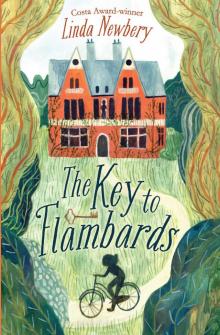 The Key to Flambards
The Key to Flambards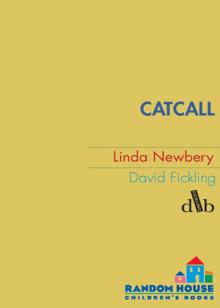 Catcall
Catcall Sisterland
Sisterland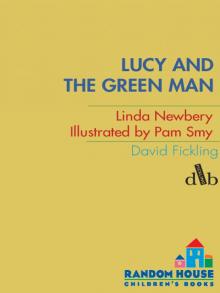 Lucy and the Green Man
Lucy and the Green Man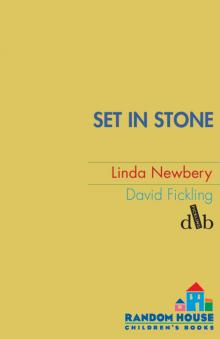 Set In Stone
Set In Stone Lob
Lob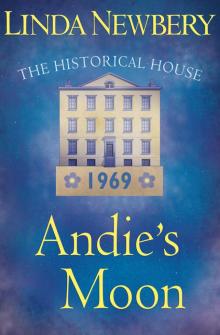 Andie's Moon
Andie's Moon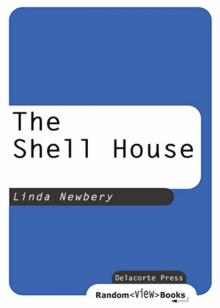 The Shell House
The Shell House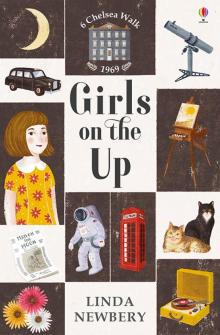 Girls on the Up
Girls on the Up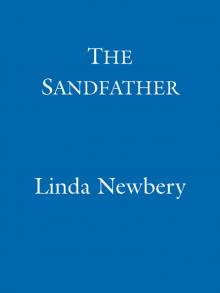 The Sandfather
The Sandfather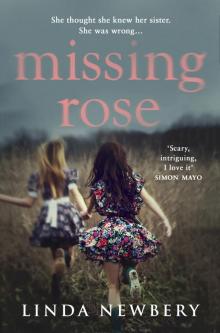 Missing Rose
Missing Rose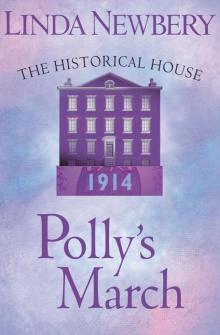 Polly's March
Polly's March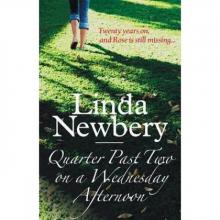 Quarter Past Two on a Wednesday Afternoon
Quarter Past Two on a Wednesday Afternoon Flightsend
Flightsend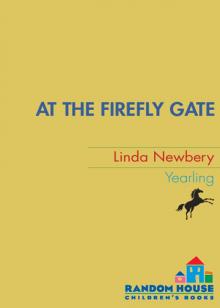 At the Firefly Gate
At the Firefly Gate